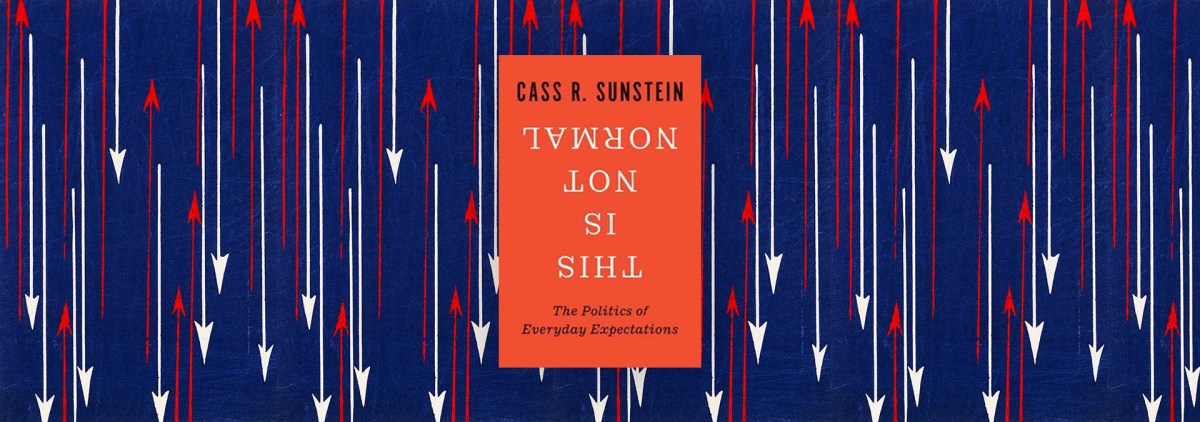[ad_1]
In Cass Sunstein’s book This is Not Normal, he observes that “…the success of President Trump has made many people fear that a president, with his current powers, might have the ability to undermine the foundations of a democratic order, above all by altering the understanding of what counts as normal.”
Um, yes. I should say so. Even with the new face in the White House, the Trump administration is in our rearview mirror in much the same way as the T-Rex was in Jurassic Park. We barely made it. And like the T-Rex, even if we managed to give him the slip, Trump—and everything he represents—is still out there.
While Trump and Trumpism do seem to be part of the exigence of this book, they are not its focus. In fact, if in picking up this book you are hoping for a table-pounding condemnation of the destruction that Trump hath wrought, you won’t get it. If you need a pained exegesis of Trump’s America, you won’t find it here. If you want to see the Trump administration and all its horrors mercilessly dissected like a frog pinned on a wax tray in a middle school science classroom, this isn’t the book for you.
But, if you are in the market for a measured, thoughtful, multi-pronged, emotionally muted exploration of the mechanics of normalcy, then you have come to the right place.
For the most part, Sunstein’s book is not part of the current conversation going on around the value of our “normal.” While some are relieved that we can “get back to normal,” others point out that pre-Trump “normal” left a lot to be desired. Sunstein’s focus is not on evaluating the American “normal” so much as analyzing how it is constructed and the means by which it can be altered.
He uses an impressive array of historical lenses to do this. Some of these lenses have been frequently employed, such as his examination of daily life in Nazi Germany, or his excellent investigation of the relationship between the founders’ intentions and the republic we are living in today. Other lenses offer refreshing insight into how our sense of what is normal is affected by other civic institutions. Sunstein’s revealing analysis of the role the courts have played in engineering the normal demonstrates how their use of judicial power has at times come at the expense of democratic self-governance.
Along with the historical perspectives he presents, Sunstein also integrates psychology and social science into This is Not Normal, with fascinating results. In the chapter “The New Normal,” Sunstein introduces the science behind a phenomenon he calls “opprobrium contraction.” According to Sunstein, opprobrium contraction helps to account for shifting norms by recognizing the power of the prevalent: “If people are surrounded by conduct that is morally abominable, or seeing a lot of it, they will not disapprove of, and may even be fine with, conduct that is morally bad (but not abominable).”
Sunstein engages at length with other thinkers and writers, often spending the bulk of a chapter relaying the contents of other texts, chiming in occasionally to reframe or expound on their ideas. At times it feels like a chatty, pleasant guided tour through Sunstein’s library.
This makes the instances in which Sunstein’s own ideas are in the foreground particularly notable. In one colorful chapter, he cops to a short but passionate teenage infatuation with Ayn Rand, puzzling over her continued status as a “norm entrepreneur” despite the fact that she “did not even offer a single interesting argument.” In the chapter “Lapidation and Apology,” Sunstein earnestly criticizes “lapidation,” a term he adopts to describe a sort of modern-day social stoning that occurs when those who are perceived to have violated social and political norms are targeted with “excessive or unjustified” public outrage. While he acknowledges that sometimes public outrage is justified, he argues that lapidation never is, and admonishes lapidators that “‘He that is without sin among you, let him cast the first stone.’”
There is no doubt that Sunstein is in favor of a kinder, gentler republic. In evaluating the legacies of an assortment of American radicals, he notes that “it’s hard to find kindness” in one radical’s work. In the same chapter, he defends the metaphor of the American “melting pot” from another radical’s criticism, stating:
“He was right to say that the metaphor…is far too simple. But it does capture an idea: a shared national identity through which people of disparate racial, ethnic, and religious backgrounds come to identify as distinctly American. That is an admirable ideal. It makes a form of civic equality possible; it softens social divisions; it is often friendly and kind.”
All this can feel a bit bunny hill after the black diamond of the last four years. But, for those of us who have been staring directly into the political eclipse of the Trump administration for so long, Sunstein offers a valuable opportunity to tear our seared corneas away from the American carnage. By shifting our focus to the ether of the “normal,” he allows us to glimpse the push and pull of the less visible forces that have aligned our country just so.

NONFICTION
This is Not Normal
by Cass R. Sunstein
Yale University Press
Published February 9th
[ad_2]
Source link
